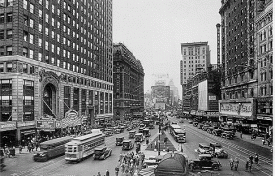[amazon_link id=”0345497422″ target=”_blank” container=”” container_class=”” ]New York: the Novel[/amazon_link] by Edward Rutherford caught my eye while looking through the Amazon Kindle store nearly two months ago. It is an historical fiction detailing the antiquity of New York City from the time the Dutch settled the area as New Amsterdam, to the terrorist attacks of 9/11 in 2001–nearly 350 years. It sounded like something I could “devour” over the course of a week or so, even though it is over 800 pages in print form (I read it on my Kindle). So I purchased it, and began reading intently.
 The narrative begins with the Van Dyke’s: a well off Dutch family that traded furs and other popular goods for a living. The author strategically places the family in different important events in the city’s early history, while still developing the characters so the reader can get to know them. Eventually, the Van Dyke’s marry into the Master family, newly arrived English immigrants who came when the Crown took the colony from the Dutch. From then on, the book centers on the Master family all the way to the conclusion, while introducing and developing many other protagonists: from an African-American slave family, to the Irish O’Donnell’s, then to the Italian Caruso’s, and briefly, the Jewish Adler’s. This sounds somewhat interesting so far, doesn’t it?
The narrative begins with the Van Dyke’s: a well off Dutch family that traded furs and other popular goods for a living. The author strategically places the family in different important events in the city’s early history, while still developing the characters so the reader can get to know them. Eventually, the Van Dyke’s marry into the Master family, newly arrived English immigrants who came when the Crown took the colony from the Dutch. From then on, the book centers on the Master family all the way to the conclusion, while introducing and developing many other protagonists: from an African-American slave family, to the Irish O’Donnell’s, then to the Italian Caruso’s, and briefly, the Jewish Adler’s. This sounds somewhat interesting so far, doesn’t it?
Well to begin with my criticism’s, I have to mention the editing errors. Two were obvious; however, there were a few others of which I cannot remember the exact details. The first was when one of the Master’s and his son were travelling to along the newly constructed Erie Canal to the Niagara River. The author declares that Lake Ontario is higher than Lake Erie; therefore, the Niagara Falls. Sorry, Mr. Rutherford and team: it’s the other way around–Lake Erie is higher than Lake Ontario. If geography was truly how the author describes it, then the salty water from the Atlantic would be flowing into and filling up the Great Lakes at a very rapid pace. Now, if this was a ‘B’ book by a little known author, I could understand. But New York is written by a well known, best-selling historian, and by a renowned publisher.
On top of that editing error, the author also declares that General Grant defeated General Lee at Gettysburg in early July, 1863. There’s a large problem with that: General Ulysses S. Grant was taking Vicksburg, Mississippi when General Lee was defeated at Gettysburg, Pennsylvania by another general: George G. Meade. I’ll forgive Mr. Rutherford for this one, though. He’s British by nationality. On top of that, he states several pages later that General Grant took Vicksburg on July 4, 1863–he is correct there.
However, as a Christian, the most disappointing aspects of New York had to do with the lack of truly moral characters. It seemed that nearly every protagonist throughout the narrative was either unfaithful to their mate or a fornicator. Truly, Mr. Rutherford, is this history? America, it its early days, had a very high moral code, that I believe a large portion of the population adhered to, whether they were born-again Christians or not. Yes, New York was–and still is–a very seedy city. Yet, was everyone this debauched? The closest person I saw to be truly moral was Mercy Master, during the time of the Great Awakening. But even her and her husband’s “religious experience” was extremely shallow. Mercy did seem to have a complete change of heart after going to hear the great George Whitefield preach. She then invited her husband, and he reluctantly attended. The book describes him listening to the preacher’s words, and to me, it really seemed like he might have had a true awakening in his soul. But instead, the author goes off on some tangent that made it like he had some intellectual awakening while listening to Mr. Whitfield that Mercy was the one he wanted to marry. So, Mr. Master listened to a sermon on hell and repentance and fell in love. I have never read anything that absurd in a while.
My last problem with New York has to to with me getting bored with the reading. This narrative took me nearly two months to read, and not just because it was long. The last half seemed to drag on uncontrollably. The only interesting portions to me in the last half (basically from the Civil War era on) had to do with the whole financial market, and its kingpin: J.P. Morgan. Other than that, the 20th century was basically a dry telling of a well-off yuppie family that either wanted more money, or more recognition.
It saddens me somewhat, because this book, I think, had so much potential; but it falls short in my mind in so many areas. Some of Edward Rutherford’s other books appeared interesting to me (London, The Forest, Sarum, and Russka); but now, with the taste of New York in my mouth, I will hesitate before reading another work by this author.
 But for me, it was a bit more complex than my wife. I knew that I wanted an Android (operating system) phone. I had researched it enough, and had heard a lot of good word-of-mouth compliments on it. I confidently settled on the HTC Evo Shift. I didn’t even know what I gotten myself into. I would have never dreamed how much I enjoy this phone now! It’s almost like they designed the operating system just for me! Everything is very customizable. The widget feature on the desktop is fantastic. The whole navigation scheme is perfect. The integration with email and phone is seamless. The look of it is clean as a whistle. And I have just had this phone for a few weeks!
But for me, it was a bit more complex than my wife. I knew that I wanted an Android (operating system) phone. I had researched it enough, and had heard a lot of good word-of-mouth compliments on it. I confidently settled on the HTC Evo Shift. I didn’t even know what I gotten myself into. I would have never dreamed how much I enjoy this phone now! It’s almost like they designed the operating system just for me! Everything is very customizable. The widget feature on the desktop is fantastic. The whole navigation scheme is perfect. The integration with email and phone is seamless. The look of it is clean as a whistle. And I have just had this phone for a few weeks!


